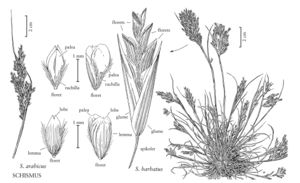Difference between revisions of "Schismus arabicus"
Common names: Arabian schismus
Treatment appears in FNA Volume 25. Treatment on page 307.
FNA>Volume Importer |
FNA>Volume Importer |
||
| Line 17: | Line 17: | ||
-->{{Treatment/Body | -->{{Treatment/Body | ||
|distribution=Utah;Calif.;Ariz.;N.Mex.;Nev. | |distribution=Utah;Calif.;Ariz.;N.Mex.;Nev. | ||
| − | |discussion=<p | + | |discussion=<p>Schismus arabicus is native to southwestern Asia, but it is now established in the southwestern United States, growing in open and disturbed sites.</p> |
|tables= | |tables= | ||
|references= | |references= | ||
| Line 33: | Line 33: | ||
|basionyms= | |basionyms= | ||
|family=Poaceae | |family=Poaceae | ||
| + | |illustrator=Linda A. Vorobik and Hana Pazdírková | ||
|distribution=Utah;Calif.;Ariz.;N.Mex.;Nev. | |distribution=Utah;Calif.;Ariz.;N.Mex.;Nev. | ||
|reference=None | |reference=None | ||
| Line 38: | Line 39: | ||
|publication year= | |publication year= | ||
|special status= | |special status= | ||
| − | |source xml=https:// | + | |source xml=https://bibilujan@bitbucket.org/aafc-mbb/fna-data-curation.git/src/314eb390f968962f596ae85f506b4b3db8683b1b/coarse_grained_fna_xml/V25/V25_970.xml |
|subfamily=Poaceae subfam. Danthonioideae | |subfamily=Poaceae subfam. Danthonioideae | ||
|tribe=Poaceae tribe Danthonieae | |tribe=Poaceae tribe Danthonieae | ||
Revision as of 16:19, 30 October 2019
Plants annual. Culms (2)6-16 cm. Ligules 0.5-1.5 mm, of hairs; blades 4-6 cm long, 0.5-2 mm wide, abaxial surfaces glabrous or sparsely pubescent, adaxial surfaces sparsely to densely pubescent. Panicles (1)2-3.5 cm. Spikelets 5-7 mm. Lower glumes 4.2-6.2 mm, equaling or exceeding the distal florets; upper glumes 4-6 mm; lemmas 1.8-2.6 mm, with dense, spreading pubescence between the veins, lobes longer than wide, acute to acuminate; paleas 1.5-2.2 mm, shorter than the lemmas; anthers 0.2-0.5 mm. Caryopses 0.5-0.8 mm. 2n = 12.
Distribution
Utah, Calif., Ariz., N.Mex., Nev.
Discussion
Schismus arabicus is native to southwestern Asia, but it is now established in the southwestern United States, growing in open and disturbed sites.
Selected References
None.
Lower Taxa
None.
